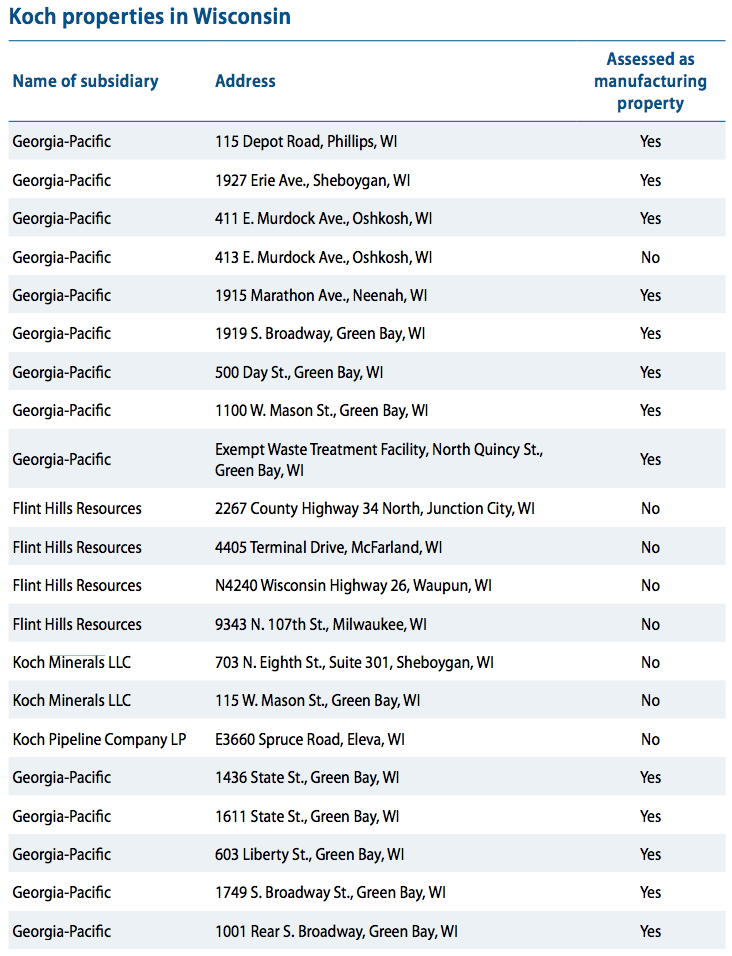In Wisconsin, a Koch Industries–backed group recently moved closer toward a major legislative victory, with an anti-regulations bill it has pushed for years passing in the Wisconsin Senate.
That bill, the REINS (Regulations from the Executive in Need of Scrutiny) Act, passed 19-14 as SB 15. It mandates that if a proposed rule causes “$10 million or more in implementation and compliance costs” over a two year period, that regulation must either be rewritten or discarded. Before taking effect, it still has to pass an Assembly vote and get the signature of Republican Governor Scott Walker.
The Wisconsin version of REINS has moved in parallel to a federal version moving through Congress, also called the REINS Act. It too has been pushed for years by the Koch-funded network, which passed in January in the U.S. House of Representatives and now awaits a Senate vote. The federal version has the backing of President Donald Trump.
A major force behind both versions of REINS is the Koch-founded and funded group, Americans for Prosperity (AFP). In Wisconsin, AFP ran an advertising campaign in support of the bill, started a petition, testified for it at a hearing, and deployed lobbyists to advocate on its behalf. After the bill passed in the Wisconsin Senate, AFP praised the legislative body’s efforts.
“The Wisconsin REINS Act would require that new regulations with an economic impact on the taxpayer greater than $10 million be voted on by the people’s representatives in the legislature,” reads the petition. “This one change would tie the hands of big government activists for generations to come, restore Democracy to regulations, and provide businesses with the certainty they need to invest in jobs and wages in Wisconsin.”
Unmentioned in the petition: Wisconsin-based Koch businesses could also benefit financially from the bill if it becomes law, as its business assets in the states are highly polluting. Koch Industries owns subsidiaries including Georgia-Pacific, Flint Hills Resources, and Koch Minerals, which in turn own assets such as paper production mills, pipelines, and oil and gas storage facilities.
Credit: Center for American Progress
In May, for example, Flint Hills Resources announced an expansion project for its Wisconsin-based oil and gas terminal network.
The expansion “will give us the ability to supply our customers with more of the gasoline and diesel fuel they need when they need it,” Brian Leigh, general manager of marketing for Flint Hills Resources in Wisconsin, told the industry publication Bulk Transporter at the time. “We expect these projects will help us keep up with demand and improve our ability to serve our customers.”
Rep. Adam Neylon, the sponsor of the Assembly bill which will begin moving in June on the full floor, received a $1,000 campaign contribution from AFP for his successful 2016 electoral run, in which he raised $18,000. Sen. Devin LeMahieu, the sponsor of the Senate bill, is a dues-paying member of the American Legislative Exchange Council (ALEC), according to financial disclosure forms. ALEC has a model resolution promoting the federal version of REINS.
Others joining AFP in lobbying efforts for REINS in Wisconsin have included business trade groups such as the American Petroleum Institute, Wisconsin Paper Council, Wisconsin Industrial Energy Group, and Wisconsin Utilities Association. Georgia-Pacific is a member of the Paper Council.
AFP‘s Wisconsin lobbying team includes Eric Bott, former Policy Director for Wisconsin Senate Majority Leader Scott Fitzgerald, and Thomas Fonfara, former Policy Adviser for Republican Governor Tommy Thompson. Governor Walker has also included language similar to that found in REINS in his proposed budget.
“Shut Down Government”
Beyond the $10 million figure, an amendment inserted into the bill also gives the Wisconsin Legislature’s Joint Committee for Review of Administrative Rules (JCRAR) the ability “to indefinitely object to any proposed rule, for the same reasons a temporary objection may be made under current law,” explains the Wisconsin Legislative Council, a nonpartisan legal and policy research arm of the Wisconsin Legislature. “Under this provision, an agency would not be able to promulgate a rule following indefinite objection unless a bill authorizing such promulgation was enacted into law.”
JCRAR is a joint committee of the state Senate and Assembly which has oversight of rules and regulations proposed by the executive branch. For AFP, the bill serves as a way to check the power of what it describes as “faceless, nameless bureaucrats.”
“By requiring the legislative approval of the most expensive rules,” Eric Bott, AFP Wisconsin’s state director, said in his March 30 testimony in front of the Senate Committee on Operations, Technology, and Consumer Protection. “SB 15 would restore democracy to our regulatory process, add accountability, and improve the responsiveness of state agencies to the needs of citizens and employers.”
Democratic members of the Legislature, such as Sen. Kathleen Vinehout, have decried the bill.
“This is the broadest, most dangerous bill you’ve never heard of,” she told Wisconsin Public Radio. “It’s an obscure way to shut down government from doing something that the Legislature intended it to do.”
The Wisconsin Sierra Club echoed Vinehout in its concerns about the bill’s ability to potentially “grind the regulatory process to a halt.”
“Passage of the bill would place a great burden upon the legislature to review and approve agency regulations on time and in a politically charged climate, and in many cases without the necessary technical expertise that state agencies possess,” remarked the Club, which has also lobbied against the bill. “Ultimately, this will result in far fewer regulations, many of which may be sorely missed as environmental, safety, and health standards correspondingly fall.”
Main image credit: Richard Hurd | Flickr
Subscribe to our newsletter
Stay up to date with DeSmog news and alerts







